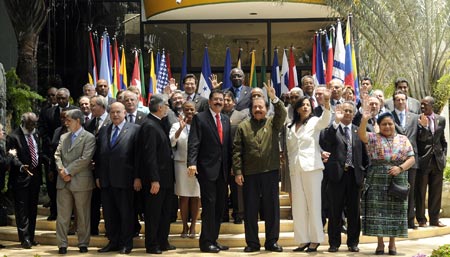The lifting of a 47-year-old ban on Cuba by the Organization of American States (OAS) marks the failure of the United States' isolation campaign against the island country.
 |
|
Participants to the 39th General Assembly of the Organization of American States (OAS) have their family photo session in San Pedro Sula, Honduras, June 2, 2009. The 39th OAS General Assembly kicked off here on Tuesday, during which the re-entry of Cuba to the OAS will be discussed. [Rafael Ochoa/Xinhua] |
At the 39th OAS general assembly in the Honduran city of San Pedro Sula, the 34 members on Wednesday unanimously voted in favor of revoking Cuba's exclusion from the group.
As of now, all technical obstacles to Cuba's re-entry to the OAS have been removed, though the United States insists Cuba's final return to the organization should be discussed on the basis of "OAS principles, values and practices."
Analysts said the event shows Washington's isolation campaign against Cuba has failed.
Founded in 1948 as a regional political organization, the OAS had the United States as its leader and a major financial supporter in the early days, and member states had to conform to U.S. values and standards of democracy.
Cuba was shut out of the OAS in 1962 during the Cold War when the United States imposed pressure on the organization in an attempt to overthrow the socialist government of Cuba and isolate it.
Voices opposing U.S. sanctions against Cuba were not heard at a time when the U.S. called the shots in Latin America. However, as Washington's influence in Latin America has dwindled over the years, left-wing leaders such as Venezuelan President Hugo Chavez and Brazilian President Luiz Inacio Lula da Silva have become the major forces in the region.
 |
|
Delegates applaud after the Organization of American States (OAS) general assembly reached an agreement to readmit Cuba during its plenary session in San Pedro Sula, Honduras, June 3, 2009. The Organization of American States on Wednesday has ruled in favor of the return of Cuba to the body. [Jairo Cajina/Xinhua] |
Latin American countries also became increasingly wary of U.S. interference in their internal affairs as they improved relations with Cuba.
On Monday, with the resumption of diplomatic relations with El Salvador, Cuba has now restored formal ties with all Latin American countries.
On Tuesday, Honduran President Jose Manuel Zelaya, Nicaraguan President Daniel Ortega, and Paraguayan President Fernando Lugo all said the OAS should revoke Cuba's exclusion from the organization. U.S. Secretary of State Hillary Clinton had left the meeting but her deputy Thomas A. Shannon, Assistant Secretary of State for Western Hemisphere Affairs, continued to join the discussions.
As countries in the entire Latin America and Caribbean region support Cuba's re-entry into the OAS, the final move now depends only on the United States and Cuba itself.
Last Friday, a U.S. State Department spokesman said: "We would welcome the day when Cuba is able to join the OAS, but ... they have to take certain concrete steps in order to meet democratic principles that define OAS membership."
However, Cuba and its leaders have repeatedly said they are not interested in rejoining the OAS.
After Barack Obama took office as U.S. president, Washington admitted its policy toward Cuba has "failed" while seeking to improve ties with the country by lifting U.S. restrictions on travel and cash remittances to Cuba for Cuban-Americans with relatives on the island.
Whether or not Cuba returns to the OAS will have a far-reaching influence on U.S.-Cuban relations.
(Xinhua News Agency June 5, 2009)